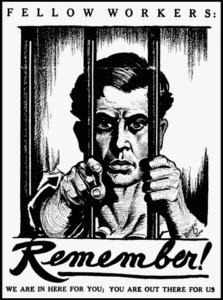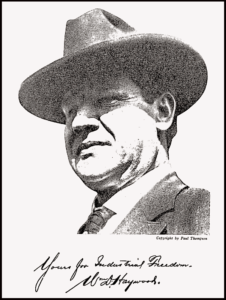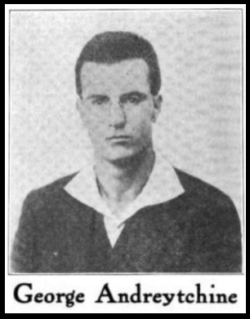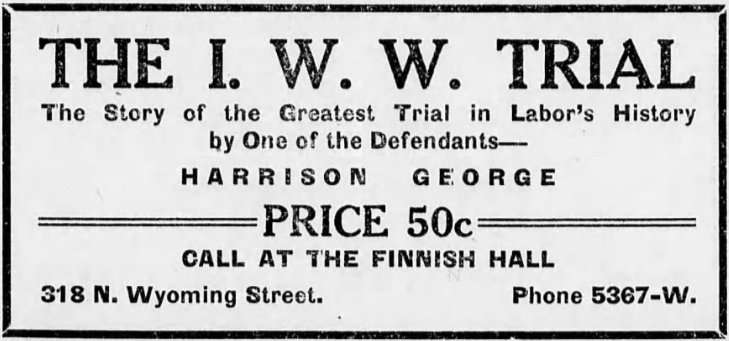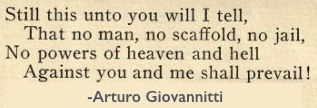
Hellraisers Journal, Thursday April 4, 1918
Chicago, Illinois – Federal Trial of I. W. W. Underway
From The Salt Lake Tribune of April 1, 1918:
100 I. W. W.’S WILL GO TO TRIAL TODAY
—–
Government’s Charged Include Sabotage,
Intrigue and Conspiracy.
—–
CHICAGO, March 31.-More than 100 Industrial Workers of the World will go on trial tomorrow before Federal Judge Landis, charged with conspiracy to disrupt the government’s war programme.
One hundred and sixty-five men and one woman were named in the true bill returned by the September grand jury, but forty escaped capture. Cases against ten have been dismissed, and three, including the woman, Elizabeth Gurley Flynn of New York, have been granted separate trials.
The government’s charges against the defendants include allegations of sabotage, including the slowing down of production and the wanton spoilage of material, propaganda for strikes to delay the output of war munitions and covert intrigue against military service.
The trial, upon the outcome of which is declared to hang the fate of the syndicalist movement in the United States, may last for six months.
The I. W. W. will be represented at the trial by George F. Vanderveer of Seattle, who has won several important cases of the organization, Otto Christensen of Chicago, and Miss Catherine Lowe, a member of the Kansas City bar.
The government will be represented by Assistant Attorney General William C. Fitts of Washington, D. C.; District Attorney Charles F. Clyne, Frank K. Nebeker of Salt Lake and Claude R. Porter of Des Moines, special assistants to Attorney General Gregory.
———-
[Photograph added.]
From The Salt Lake Tribune of April 2, 1918:
I. W. W. TRIALS ARE HALTED BY MAN’S ILLNESS
—–
Court Adjourned by Judge Landis for Physicians
to Carry On Test of Editor’s Condition.
—–112 CHARGED WITH WORK AGAINST WAR
—–
Arturo Giovannatti Case Is Dismissed;
“Big Bill” Haywood, Secretary,
Is Among Prisoners.
—–
CHICAGO, April 1.-Leaders and organizers of the Industrial Workers of the World, more than one hundred in number, entered pleas of not guilty today at the opening of the trial in which the government will attempt to prove that the defendants violated the espionage act, plotted to destroy industries and conspired to hamper prosecution of the war.
With but one exception, all of the 113 defendants were in court when Federal Judge Landis ordered their names called for formal pleading. Albert Kimball, who was out on bail, was reported seriously ill.
Examination of prospective jurors will be continued when court reconvenes tomorrow. Nineteen veniremen were excused today, some pleading that they were engaged in food production. A panel of 100 veniremen called for today will be supplemented by fifty more tomorrow.
Manacled and Guarded.
Poets, lumber-jacks and political writers and speakers were among the defendants who, manacled and carefully guarded, were brought into the courtroom in groups of ten. Their raiment, including overalls, flowing ties and fancy waistcoats, regaled crowds of spectators, only a few of whom gained entrance to the courtroom. Former associates of the defendants staged striking reunions, some falling into embraces.
George F. Vanderveer, chief counsel for the defense, said tonight witnesses had been called by the defense from all parts of the country, with a view to proving that the I. W. W. is simply an organization of workers. The defense will attempt to show by these witnesses that while the organization feels that the present political system is too slow for industrial and social reforms, there has been no attempt to cripple industry or block war plans.
Because of lack of evidence the case against Arturo Giovannatti [Giovannitti], one of the editors of “The Masses,” and leader of the Lawrence, Mass., textile strike, was dismissed.
There was a round of handshaking when William D. (“Big Bill”) Haywood, general secretary-treasurer of the I. W. W., took some difficulty was found in making a few of the prisoners keep their heads bared.
Federal officials and counsel for the defense expressed the belief that at least a week would be required in which to select a jury.
Defendants Surprised.
The dismissal of the case against Giovannatti caused somewhat of a stir among other defendants, as it came as a surprise.
“Your honor, I wish to enter protest over the government’s action in compelling me to come from New York instead of notifying me that the charges were to be dropped.” Giovannatti said.
“I agree with you. You should have been notified,” Judge Landis replied.
It was announced that a special examination will be made of charges against George Andreytchine, a Russian boy who figured in the legislative investigation of Minnesota iron range conditions at St. Paul a year ago. It was reported that the government’s case against him might be dropped, although he is known as one of the strongest proponents of sabotage.
At the age of eighteen Andreytchine fled from Russia, where, as editor of a radical newspaper, he had urged a revolution similar to the one that later took place.
Judge Landis today ordered special physical examinations in the cases of Albert Kimball and J. A. MacDonald. MacDonald, who is one of the principal defendants from the Pacific coast district, appeared in court, but his condition was such that his removal was necessary.
Hundreds of witnesses have been summoned and tons of literature, seized by the government during raids on head-quarters of the I. W. W. are stored in the federal building ready to be used at the trial.
After the United States entered the war, government agents worked for several months obtaining evidence on which to base warrants for the arrest of members of the organization, who it was charged had hindered the manufacture of war materials by starting strikes in factories, in the harvest fields and in the mines, and had also interfered with the operation of the selective service act.
Many Raids Made.
Early in September raids were made by the United States marshals on I. W. W. headquarters in various cities of the country and many members of the organization arrested and much documentary evidence obtained. Three weeks after the arrests, indictments against 100 persons admitting membership in the I. W. W. were returned by the federal grand jury in Chicago. Forty have not been arrested, ten have been dismissed and separate trials have been granted to three of the accused, including Elizabeth Gurley Flynn of New York. Among those who went to trial today was William D. Haywood, secretary-treasurer, who was arrested in Chicago headquarters of the organization.
[Attorneys were here named, see above article for names of same.]
All attorneys connected with the case agree that it cannot be finished in less than six weeks and several predict that the end will not come for six months.
———–
[Photographs added.]
SOURCE
The Salt Lake Tribune
(Salt Lake City, Utah)
-April 1, 1918
https://www.newspapers.com/image/289576939/
-April 2, 1918
https://www.newspapers.com/image/289577429/
IMAGES
WWIR, In Here For You, Ralph Chaplin, Sol Aug 4, Sept 1, 1917
https://libcom.org/files/rebel-voices-2_0.pdf
See: p323
Big Bill Haywood, ISR, Nov 1917
https://archive.org/stream/ISR-volume18#page/n138/mode/1up
George Andreytchine, ISR, Sept 1916
https://play.google.com/books/reader?id=SVRIAAAAYAAJ&printsec=frontcover&pg=GBS.PA170
See also:
The I.W.W. Trial:
Story of the Greatest Trial in Labor’s History
-by one of the defendants, Harrison George
—-with introduction by A. S. Embree.
IWW, [Date: after Aug 1918, before Mar 5, 1919]
https://catalog.hathitrust.org/Record/100663067
Note: nearest I can come to date of publication for H. George’s account of trial is:
The Butte Daily Bulletin
(Butte, Montana)
-Mar 5, 1919
https://www.newspapers.com/image/176048912/
Prison Song by Ralph Chaplin, Ohio Socialist, Mar 10, 1918
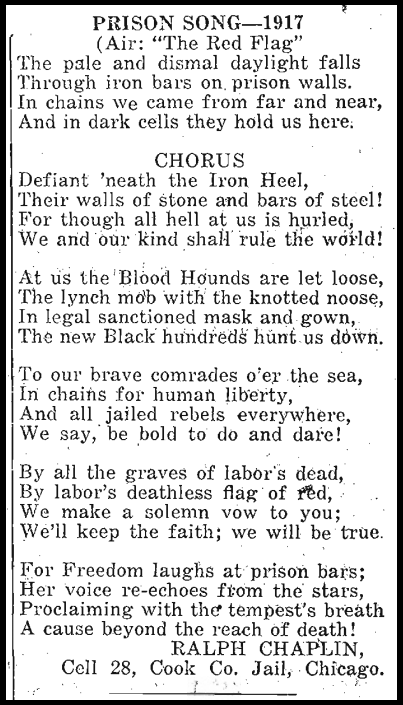
—–

